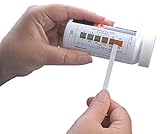
Have you recently moved and notice that your hair changed texture lately? Maybe it’s falling out or appearing dull and limp? Your hair woes might not be your diet, your hormones, or even your hair products.
Before you rush to the doctor, you should take a look at the quality of your water.
How to Safe your Hair from Hard Water
Hard Water and Hair
The hard water effects on hair are pretty obvious when you examine what’s going on. The water coming out of your faucet isn’t just H2O. In it are minerals and chemicals that can damage your hair, especially if your water is hard.
What is Hard Water?
Hard Water is defined as water that has a high concentration of minerals such as calcium and magnesium.
The water in your local water table becomes hard when the ground water is filtered through natural water table hardening agents such as limestone and chalk. The hardness contributes to a different look, feel, and taste between different areas that you might notice when you travel.
Water has a natural pH between 6 and 8.5, with pure water at a pH of 7. The harder the water, the higher the pH. According to some estimates, over sixty percent of the water we drink is groundwater. This means that more likely than not, you’re drinking hard water.
How to Determine if you have Hard Water
There are a few ways to determine if you have hard water. The first is to see how your tap water responds to soap. If you need a fair bit of soap in order to make the water lather with bubbles, then your water is hard.
Another test? Look at your shower head. Is it covered in a white film or crust? Those white bits are mineral deposits, which is a sure sign of hard water.
Another test is to look at if you need a rinse aid in your dishwater. If you end up with white spots without a rinse aid, then you have hard water. Hard water also results in dingy and rough clothing and soap stains in sinks and bathtubs.
Alternatively, you can contact your local municipality and obtain a water report from them. To learn more about water and quality standards, visit the EPA’s website on drinking water.
You can also simply look at your area on a water hardness map (see below). The darker the color, the harder the water.

If you live outside the United States, look at the way your water responds to soap and if it leaves a film on faucets, shower heads, and drinking glasses.
Still not sure whether you live in an area that is affected by hard water? Then this simple test might be something for you:
Bestseller No. 1
Hach 2745250 Total Hardness Test Strip, 0-425 mg/L, 50 Tests
- Hardness increases soap consumption in laundries and causes scale in boilers
- 0-425mg/L
- Sold in each
Why Can Hard Water lead to Hair Loss?
The theory about hair loss and hard water is that the minerals cause the hair follicles to be weighed down and to weaken, which causes breakage.
Another reason for hair loss is the increase in soap deposits hard water causes. Washing the shampoo, hair products, and the mineral deposits out of your hair becomes harder and harder as you get more buildup. The buildup causes you to use more and harsher soap. This never-ending cycle can cause you to wash your hair more often and thus lose more hair.
Solving the Hard Water Problem
There are several ways to fix the hard water problem and restore your hair back to a shiny, full state you know is possible. These are the following:
- Wash with distilled water
- Alter the pH with an acidic rinse
- Use hair products designed for hard water
- Install an in-home water softener
- Install a shower filter water softener
Short Term Solutions
1. Quick Fix: Use a Bottle of Distilled Water for the Final Rinse
One way to see if your hair is hurting from hard water is by rinsing with distilled water for a week. By rinsing, I mean rinsing all shampoo and conditioner out with the bottle of water instead of with the water from your shower head.
If this improves the look and feel of your hair, then you can try one of the options below as a more long-term fix.
2. A Natural Remedy: Use a Natural Hair Rinse that is high in Acidity
Instead of rinsing with bottled water, try rinsing with a natural agent that’s high in acidity such as vinegar or lemon juice.
What you’ll do is mix one part lemon juice or vinegar with two parts water and pour it over your head as the final rinse.
This will rinse out the soap residue and leave your hair shinier and softer.
The caveat is that this option could dry your hair out, so cut back on the frequency if you experience dryness.
3. Get a special Shampoo or Conditioner that’s made to Fight Hard Water
Another option is to use a shampoo or conditioner specifically designed for hard water. Here you have two options.
One type of shampoo will mitigate the minerals in the water and act as a softener, thus preventing buildup.
One of the best shampoo for hard water is the “Ion Hard Water Shampoo“, which eliminates build-up, reduces dryness and damage, is safe for color-treated hair, and which is safe for daily use.
Another option is the “Malibu C Hard Water Wellness Kit“, which is a package of shampoo, conditioner, and special treatment that together treat your hard water hair and remove the extra minerals and restore it to a soft and shiny state. A shampoo for hard water cost you between $15 and $50 depending on the size and package you buy.
Option two is to use a clarifying shampoo or conditioner. A clarifying product will remove the buildup in your hair once it’s formed.
An example is Neutrogena’s “Anti-Residue Shampoo“, which is designed for once-a-week buildup removal.
No matter the clarifying shampoo you use, never use it more than once a week. Just like the vinegar rinse, it can strip hair too much and cause more damage than it prevents.
Since product build up is a common concern, most hair care brands make a clarifying shampoo. This means that you’re likely to find a clarifying shampoo within your budget no matter what your budget is. For example, Suave makes a version that is under $3 per bottle.
Note: Read this post to find out more about the best chelating shampoos to safe your hair from hard water.
Long Term Solutions
4. Lower the Mineral Content by using a Water Softener
Products work well in the short-term, but the costs quickly add up.
The best long-term solution is to soften your water with an in-house water softener.
According to Popular Mechanics, a water softener works by exchanging the minerals in your water for sodium, leaving soft water. Unfortunately, this is an expensive option. Expect to pay between $400 and $3000 for a unit and installation. You’ll have to add salt every few weeks which costs an extra $7 to $25 per bag.
The benefit to a water softener is that it softens all the water in your house. Soft water is better on your dishes, better on your clothing, and better on your pipes and mechanical appliances (such as your coffee maker, washing machine, and dishwasher).
You’ll also avoid some of the purported health risks of hard water, which include increased risks of cancer, heart disease, and diabetes. This is because when you drink and cook with hard water, you’re adding calcium and magnesium to you food. These minerals have daily limits which you may be surpassing, especially if you’re on certain medications or are already supplementing for these minerals.
5. Use a Shower Filter (cheap Alternative to a Water Softener)
A cheaper and more targeted solution is to install a shower filter.
You can purchase a shower filter for as little as $10 and as much as a few hundred dollars.
The difference in price has to do with how many contaminants and minerals the shower head filters as well as specific design features. As with other water filters, you’ll have to replace the filter every so often.
Note: You can find our review of the best shower filters for hard water here.
Conclusion
Hard water is a common cause of hair and skin problems, including hair loss.
Fortunately, you can fix it. have you tried any of the fixes listed in the article?
If you enjoyed this list or have anything to add, be sure to comment below and share your story. What worked? What didn’t?
As well, please share this post if you liked it so others can benefit.






